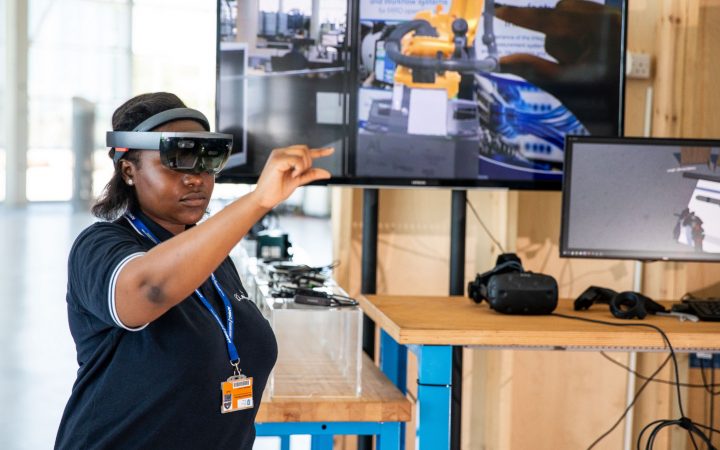
In each edition of the briefing we’ll look at a specific aspect of Sheffield’s Digital Tech cluster, but for this first one we wanted to look at the history and particular concentrations of activity in order to provide an overview of the landscape – an attempt to unpick what Sheffield’s digital technology identity is, what we’re particularly good at and why…
Sheffield has a long history of computing and applied software development stretching back decades. Indeed, The University of Sheffield was one of the very first educational institutions in the world to offer Software Engineering as an undergraduate degree in the 1980s, and the city has been fertile ground for collaborations between academia and industry in computing ever since. This is one of the reasons the University is a key partner in the national Institute of Coding and also leads on Student Enterprise. Meanwhile the city’s other University, Sheffield Hallam, has the 7th largest cohort of computer science students in the country (with 1,860 currently enrolled), and also leads the nation in providing degree apprenticeships in computing as it pursues its mission to become “The world’s leading applied university”.
Combined, Sheffield’s two city-centre universities support more than 60,000 students, with nearly 1,000 graduating in computing-related subjects each year, along with many more in other disciplines that are in high demand in the digital technology industry, such as mathematics, information science, design and creative disciplines.
On top of this, Sheffield College serves over 13,000 further education students and supports apprenticeships in subjects such as cyber security, network engineering and software development. An increasing number of the city’s secondary schools are offering specialisms in digital subjects, including the two University Technical Colleges which support courses in computing and creative digital media between them, as well as robotics, CAD and other digital engineering skills at the AMRC training centre.
This history of talent development and research collaboration has given birth to several significant technology firms. Some of these have remained independent, such as WANdisco, Zoo Digital and the Floow, while others have been acquired by larger companies but have remained in the city, notably ARM’s acquisition of Infinite Designs in 2000, Autodesk’s acquisition of Navisworks in 2007, BT’s takeover of Plusnet in the same year, and, more recently, Siemens’ acquisition of Lightworks Design at the end of 2018 and Pendo’s acquisition of Receptive earlier this year. The city is also increasingly attracting major digital employers to relocate to the city, with the likes of Sky Betting and Gaming, Jet2, Perkbox, TES Resources, Bossanova, MindBody and many others arriving over the last few years.
As a result of all this activity, over 22,000 people are now employed in digital technology jobs within the Sheffield postcode area (according to Tech Nation), and the industry spans many application areas and verticals. There are, however, a number of domains in which Sheffield can boast of specific and unique capabilities – four “pillars” of the local tech industry, which are increasingly at the heart of Sheffield’s digital economic strategy. There are many firms and capabilities in areas outside these four, of course – Sheffield is a large, vibrant city after all – but we believe that there is a strong argument to be made that Sheffield has particular “unique specialisms” in these areas, and over the next few pages we’ve teased out some, but by no means all, of the key assets and narratives…
Learning Technologies
Sheffield has been a nationally significant centre for online learning and educational technologies since even before the decision by New Labour to site UfI, the University for Industry, here in 1998. Since then, there has been a steady stream of talent and new businesses born of this activity, developing resources and platforms for learning across many different industry verticals. The success of Twinkl and Kineo, and the recent relocation of TES Resources to the city, mean that platforms hosting around 60% of all national teaching resources are now managed in the city.

Twinkl
Twinkl has grown from being an evening “sideproject” just ten years ago into the largest repository of high quality digital teaching materials in the world, with headquarters in Sheffield, a technology hub in Manchester and an Australian base in Wollongong. Twinkl now employs more than 500 people worldwide, supporting teachers, childminders, nursery workers, home educators and parents, who download over 8m resources each month. The firm is also breaking new ground in the use of Augmented Reality to enhance lessons, both with their range of collaborative learning environments such as Little Red and ARchitect, and by creating the world’s largest repository of free Apple Quick Look models.
Tribal Group
Tribal Group is an international educational technologies company, headquartered in Bristol but with a major presence at St Mary’s Court, Sheffield. The firm develops a wide range of management and operations software used by universities, colleges and alternative learning providers around the world. This includes the market-leading “SITS: Vision” student management system, which is in use by 70% of higher education institutions in the UK and many more abroad.
TES Resources
Attracted by the city’s established capabilities in learning technologies, TES Resources, the learning resources arm of TES Global, recently relocated a significant portion of their operations from London to Sheffield, taking two floors of the new 3 St Paul’s Place building in the city centre, with room for up to 200 staff. The firm brings with it the management of one of the world’s largest teaching materials repositories, with over 700,000 items shared across its distribution platforms. Their presence further underlines Sheffield’s prominence in this field alongside other global providers based in the city such as Leo Learning, Kineo and fellow new arrivals Sponge.
DESQ
Established more than 20 years ago, DESQ is among a number of local digital media agencies to have developed strong specialisms in the creation of learning experiences and platforms. Over the years they have worked with a vast array of blue-chip brands, and are at the forefront of creatively combining gaming and learning elements into their solutions. Along with other local creative learning agencies such as Can Studios, Learning Light and The Workshop, DESQ well represents the connections between the learning tech and creative tech pillars of the local digital economy.
Tutorful
Tutorful are another Sheffield startup success story in the learning technologies space, having been founded (as Tutora in 2015) in order to develop a platform to connect students and home tutors with each other across the country. With several rounds of funding behind them, and along with winning the 2017 Northern Stars startup competition, Tutorful has now emerged as the UK market leader with more than 11,000 active tutors on their platform and in excess of one million lessons served.
Creative Technologies
30 years ago, in the wake of the collapse of both the coal mining and steel making industries, Sheffield took a bold strategic decision to invest in the creative and cultural industries, designating part of the city close to the train station as the Cultural Industries Quarter and building production capabilities in music, film, theatre, arts and crafts. As these disciplines have digitised, so has much of the activity in the CIQ, alongside a substantial video game industry born from the 8-bit microcomputer era and the legacy of companies such as Gremlin Graphics and Particle Systems.

Alternate Realities @ Doc/Fest
Alternate Realities is the Sheffield Documentary Film Festival’s programme of interactive and immersive works of non-fiction. Doc/Fest (or simply “Sheffield” as it is known within the global documentary and factual programming industry) attracts thousands of film makers, commissioners and producers to the city every year, and has become the third largest factual film festival in the world since its start in 1994. The Alternate Realities exhibition and accompanying Summit conference, now showcases world-leading projects at the very cutting edge of digital experience design. That said, AR@Doc/Fest is just one of several major international events in the city that celebrate digital creativity, alongside the Children’s Media Conference, Sensoria and Algomech.
Universal Everything
Universal Everything is a digital arts studio founded by ex-Designers Republic senior designer Matt Pyke in 2004. It has since then worked with a huge range of major brands, including Chanel, Intel, Nike, Hyundai, Microsoft, Samsung and Apple, to create interactive and visually astounding experiences, as well as collaborations with international arts institutions such as the Sundance Film Festival, Sydney Opera House and Radiohead. UE created the launch animation for the largest screen ever built, the mega-screen in Times Square, in 2014. Based out of a studio in Site Gallery, itself a major institution at the intersection of art and technology, UE’s work is characterised by fluid organic movement and the interaction of procedurally generated virtual life forms.
Joi Polloi
Multi-award winning creative agency Joi Polloi specialise in producing high quality interactive experiences and platforms for the broadcast, media and cultural industries. They have worked with Channel 4 and the BBC for many years, acting as digital partners for flagship drama and reality series including Live from Space, Humans, BBC Glastonbury, The Great British Bake Off and The Circle. Their award credits include two Baftas, six Royal Television Society Awards and a Webby, among a host of nominations from all over the world.
Sumo Digital
Sumo Digital can trace its lineage directly back to Gremlin Graphics, the quintessential British video game maker from the 8-bit era of the 1980s. Today, it is one of the largest and most successful video game companies in the UK, employing over 500 staff and with studios in 6 British cities as well as a development facility in Pune, India. With the main operation still firmly here in Sheffield, and with strong ties to the local talent base via Sheffield Hallam University, Sumo has been responsible for an array of major ‘triple A’ video games since its founding in 2003, including Little Big Planet 3, Dead Island 2, Snake Pass and Team Sonic Racing, and was instrumental in paving the way for the National Videogame Museum to relocate to Sheffield in 2018.
ZOO Digital
ZOO Digital epitomises Sheffield’s creative technology sector, as a software company that provides foundational services to the international content industry. The ZOOstudio platform provides comprehensive localisation and distribution tools to content owners and distribution partners across the world, and the firm now has offices in Los Angeles and Dubai from which it is able to serve clients such as Disney, Warner Brothers and Netflix who operate globally. The data volumes and ultra-tight security requirements demanded by modern cinema and TV releases mean that ZOO has long been a pioneer in cloud infrastructure, and is continually innovating new use cases that leverage their core technologies.
Movement Technologies
With the Peak District National Park accounting for a third of the city’s area, and more trees per person than any other city in Europe, Sheffield is gaining a reputation as the “Outdoor City”, a place that provides the best in city living and healthy, active lifestyles. This, along with a historic commitment to sport-driven social and economic development and several Queen’s Award winning mobility-tech companies, has led to a huge range of research and commercial activity around the technology of movement – from the transport of goods and people, to large-scale flow-sensing, assistive technologies, active travel, autonomous vehicles and robotics.

The Floow
The Floow was founded in 2012 by academics from the University of Sheffield. Their ambition was to make vehicles safer, smarter and cheaper, by making better use of movement data and insights from the social sciences to change driver behaviour and lower the risks on our roads. In doing so over the last six years the company has significantly disrupted the global telematics industry and now has insurance customers across five continents, and offices in Italy, the USA and China in addition to their global HQ in Sheffield.
3Squared
From its roots as a fledgling web development agency in the early 2000s, 3Squared has grown to become a major player in the digital railway solutions market, providing a range of software to the industry via its RailSmart suite of applications, covering areas such as train operations, compliance, safety and performance monitoring. The firm is now increasingly involved in the use of machine learning and data analytics to make performance gains, for example by analysing weather and foliage data from satellites to reduce “wheel flats” caused by trains skidding on wet leaves.
Advanced Wellbeing Research Centre
Sheffield Hallam University’s Advanced Wellbeing Research Centre (the AWRC) is currently under construction at the Olympic Legacy Park, site of the former Don Valley Stadium. On its completion later this year it will become the most advanced research and development centre for physical activity in the world, providing state-of-the-art, fully instrumented indoor and outdoor laboratories and a team of over 70 researchers delivering collaborative research projects. The centre aims to leverage the University’s decades of sports and movement science into the realms of preventative healthcare and active lifestyles, further reinforcing Sheffield’s reputation as the ‘Outdoor City’.
MoveMore
MoveMore is a city-wide strategic programme, instigated by the National Centre of Sport and Exercise Medicine (NCSEM) and supported by a broad range of local public and private sector organisations. Its objective is to create a culture of participation in physical activity in the city, in order to improve the population’s health over the long term. At the heart of MoveMore is an activity-logging app which puts teams of people into competition with each other to log the most activity, and provides updates on new opportunities for exercise and physical activity across the city, as well as generating a huge amount of aggregated movement data for analysis.
Sheffield Robotics
Sheffield Robotics is a joint research collaboration between the two Sheffield universities, set up to pursue responsible, ethical robotics research, and pioneer new products and processes that will transform manufacturing, healthcare, infrastructure and many other aspects of human activity and being. This research currently involves over 100 academics across the city, and traces its history back to the establishment of the AI Vision Research Unit (AIVRU) in the 1970s, set up to develop computer vision systems that exploited the principles underlying human vision. Sheffield Robotics now sits at the heart of a flourishing robotics industry in the city, with spin-outs such as Consequential Robotics and Ibex Automation, as well as recent arrivals like Bossanova.
Advanced Manufacturing Technologies
The cluster of tech-driven global brands growing up around the Advanced Manufacturing Research Centre (AMRC) was identified by the Brookings Institution’s Bruce Katz in 2015 as “an innovation district unlike any other”. Four years on, the Advanced Manufacturing Innovation District is home to Boeing’s European production facility, Rolls-Royce’s “Factory of the Future” and McLaren Automotive who are “re-shoring” from Austria to build supercar bodies here in the North of England. All are drawn to Sheffield’s R&D assets covering the full suite of industrial digitalisation tech, from immersive AR and VR, to artificial intelligence, machine learning, simulation, composites, additive manufacturing and “digital twins”.

Boeing Sheffield
Boeing Sheffield’s £40m factory, which opened in 2018, has a fully digitally-enabled backbone that heralds the future of manufacturing. Before Boeing Sheffield opened its doors, the AMRC developed virtual production system models that allowed Boeing to optimise space, materials and machinery, and showed how the plant could increase productivity by 50%. Blanketed with location-tracking technology, the factory integrates location-aware tooling, parts and components with multiple systems to enable a digital thread across the factory and extending to the supply chain. This, together with performance data collected from automation, creates a digital twin of the factory which models the entire production system from goods-in to goods-out, and is the company’s Industry 4.0 exemplar.
Elements Technology
Elements Technology represent a new breed of local digital tech startups that are looking at the manufacturing industries and identifying areas where digital tools and techniques can make a transformative difference, by addressing pain-points with the right interfaces and data architectures. Their software automates many of the processes that in many small and medium sized manufacturing businesses are still done by hand or with outdated, cumbersome IT. There is now a rapidly expanding cohort of startups being born of this interaction between digital technologists and more traditional local engineering and manufacturing businesses, as mutual understanding of the challenges and opportunities increases on both sides.
The AMRC Group
Founded in 2001, the AMRC Group has close relationships with global digital transformation firms such as Siemens, PTC, Dassault Systemes, Autodesk, Accenture and IBM, and a manufacturing membership that includes the world’s leading players in aerospace, defence, space, high performance automotive and energy sectors. This creates a fertile collaborative climate for the development and adoption of industrial digitalisation technologies, along with a network of digital champions who dessiminate these processes across the membership base. Core to this mission is Factory 2050, the UK’s first state-of-the-art facility entirely dedicated to conducting collaborative research into reconfigurable robotics, digitally assisted assembly and machining technologies in a factory setting.
Lightworks
Recently acquired by Siemens PLM Software, Lightworks specialises in developing software for 3D rendering and virtual reality (VR) experiences. By incorporating Lightworks’ technology, Siemens is able to provide enhanced 3D data visualisation, high-end rendering and VR capabilities via its comprehensive suite of 3D product lifecycle management (PLM) applications. This will increase the accuracy of “digital twins” by adding critical visualisation information to the virtual product: through the entire product lifecycle from initial design prototyping and engineering, via collaborative design reviews, to simulation and testing. Using more realistic imagery, simulated physics and immersive environments helps customers identify and address potential problems very early in the life-cycle.
Razor
Working alongside software architects at the AMRC, and an Italian visual inspection system manufacturer, software development agency Razor have developed Artificial Intelligence solutions that are set to make a massive breakthrough in the inspection of critical aerospace components for a global OEM, delivering inspection rates up to 4,000 times faster than traditional methods. One of a growing number of pioneering digital SMEs in Sheffield who understand the potential of “digital meets manufacturing”, Razor are now engaged in several major projects that will transform industrial processes over the coming years. Building a relationship with the AMRC’s digital team has opened the door for Razor to grow its reputation within the industry, which has been crucial for encouraging further innovation and collaboration.
We’ll be working to analyse and describe the digital tech industry in more detail in future editions of the briefing. If you have any comments about this please do get in touch, we’re always very happy to discuss these ideas! Leave a comment, email us at info@sheffield.digital or connect with us on Slack, Twitter, Facebook or LinkedIn.
This article was published in the 2019 Q2 Quarterly Briefing. For the rest of this publication, and others in the series please visit the Sheffield Digital Ecosystem Update page.